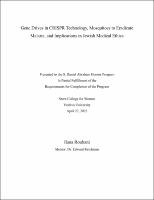Please use this identifier to cite or link to this item:
https://hdl.handle.net/20.500.12202/9023| Title: | Gene drives in CRISPR technology, mosquitoes to eradicate malaria, and implications in Jewish medical ethics |
| Authors: | Reichman, Edward Rouhani, Ilana |
| Keywords: | CRISPR gene drives vector-borne infectious diseases malaria mosquitoes kilayim (prohibited crossbreeding) Pikuach Nefesh (the obligation to save a life) Jewish medical ethics |
| Issue Date: | 27-Apr-2023 |
| Publisher: | Yeshiva University |
| Citation: | Rouhani, I. (2023, April 27). Gene drives in CRISPR technology, mosquitoes to eradicate malaria, and implications in Jewish medical ethics [Unpublished undergraduate honors thesis]. Yeshiva University. |
| Series/Report no.: | S. Daniel Abraham Honors Program;April 27, 2023 |
| Abstract: | With the discovery and advancement of CRISPR technology, gene drives have become more effective and precise, presenting new opportunities for disease prevention. CRISPR gene drives promote the inheritance of specific traits, significantly altering the genetic makeup of an entire population. CRISPR Gene drives have been proposed or used in case studies for practical purposes, with the most actively researched area involving controlling the spread of vector-borne infectious diseases. ¶ Malaria, which is transmitted by vectors, is a significant public health concern. Malaria alone kills over 650,000 people each year while afflicting 200 million more with debilitating fever. Malaria is caused by a Plasmodium parasite and is transmitted by female Anopheles mosquitoes. With the use of CRISPR gene drives, there are aims to reduce the populations of malaria-transmitting mosquitoes through either a suppression drive or a modification drive. A suppression drive is used to reduce the number of malaria-transmitting mosquitoes by altering the insect's reproductive capabilities and a modification drive is used to make the insects resistant to certain diseases by changing genes in mosquitoes to prevent them from carrying the malaria parasite. ¶ When investigating the potential applications of CRISPR gene drives in eradicating malaria through mosquitoes, it is imperative to address ethical concerns in both secular and Jewish contexts. Some of the concerns raised include unintended consequences, animal welfare, altering the natural order of creation, kilayim (prohibited crossbreeding), and Pikkuach Nefesh (the obligation to save a life). The evaluation of CRISPR gene drive applications should prioritize transparency, accountability, and public participation to effectively assess the potential advantages and disadvantages of this powerful technology. |
| Description: | Undergraduate honors thesis / Open Access |
| URI: | https://hdl.handle.net/20.500.12202/9023 |
| Appears in Collections: | S. Daniel Abraham Honors Student Theses |
Files in This Item:
| File | Description | Size | Format | |
|---|---|---|---|---|
| Ilana Rouhani Thesis OA 2023.pdf | 299.79 kB | Adobe PDF |  View/Open |
This item is licensed under a Creative Commons License

